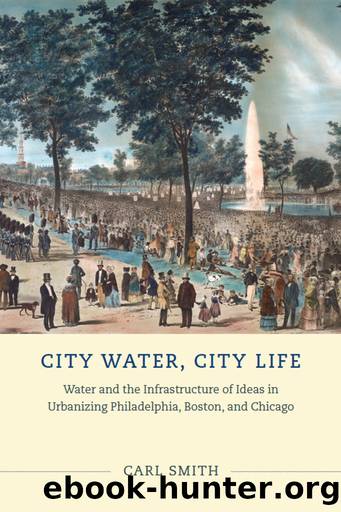City Water, City Life by Carl Smith

Author:Carl Smith [Smith, Carl]
Language: eng
Format: epub
Tags: History, General, United States, 19th Century, Literary Criticism, American, Technology & Engineering, Environmental, Water Supply
ISBN: 9780226022659
Google: WnWHHftxdqQC
Publisher: University of Chicago Press
Published: 2013-04-17T04:09:24+00:00
6
THE FLOW OF TIME
City Water as Cultural Anticipation
Nineteenth-century city life marched to a new sense of time. Its participants became accustomed to living by the dictates of the clock and the artificial rhythms of an increasingly scheduled workday. The continuous expansion and alteration of the built environment and the changes in the size and nature of the population made even the recent past seem irrelevant. This was especially true in Chicago, whose urban history was both so brief and yet so intense, as it grew exponentially on waves of newcomers. Since most residents were born and, in many cases, raised elsewhere, they had had little local heritage or memory. Taking office in March 1847, Mayor James Curtiss, who himself was in his thirties when he came to Chicago from Maine, stated, âWe are not delegated to act for an old and established communityâfor a community whose interests and whose character have been firmly settled by a gradual and almost imperceptible process.â On the contrary, he explained, âwe are to furnish precedents and speak for, to bind and control, the affairs of a city which but yesterday had no existence.â1 Bostonians and Philadelphians with local roots believed that they were rich in settled traditions, but they were a shrinking minority by the time Curtiss was sworn in. The only urban history that appeared to matter was the future that cities were making with each new day. On a deeper level, however, urbanization instilled a new understanding of the relationship between the past, present, and future, one that was clearly revealed in the ways in which they dealt with the exigencies of city water.
Cultural Anticipation
It was only natural that people living in rapidly expanding cities developed a distinctively forward-looking state of mind, a way of seeing that can be called cultural anticipation.2 As opposed to cultural memory, cultural anticipation consists not of broadly held understandings of the nature and meaning of the past, but of shared notions about the futureânot recollections of what happened, but expectations of what will be. Cultural memory influences cultural anticipation, since the attitudes and beliefs that past experience inculcates always inflect how individuals conceptualize the future. Likewise, the way people think about the future often affects how they remember the past.
As the growing populations of urban centers came to include more and more people who arrived from many disparate places, the cultural memory of cities like Philadelphia and Boston, like so much else about urban life, became more fragmented, and the desire to honor and preserve the past less powerful, even in long-settled families. The heirs of merchant and patriot John Hancock were not above selling tons of earth from his large holdings on Beacon Hill to be used as fill in order to create new and valuable real estate. The excavation undermined the foundation of architect Charles Bulfinchâs 1789 monument to the Revolution, a sixty-foot column on which an American eagle defiantly perched, so that it had to be removed in 1811 because it no longer had reliable ground to stand on.
Download
This site does not store any files on its server. We only index and link to content provided by other sites. Please contact the content providers to delete copyright contents if any and email us, we'll remove relevant links or contents immediately.
Whiskies Galore by Ian Buxton(41941)
Introduction to Aircraft Design (Cambridge Aerospace Series) by John P. Fielding(33095)
Small Unmanned Fixed-wing Aircraft Design by Andrew J. Keane Andras Sobester James P. Scanlan & András Sóbester & James P. Scanlan(32766)
Craft Beer for the Homebrewer by Michael Agnew(18200)
Turbulence by E. J. Noyes(7983)
The Complete Stick Figure Physics Tutorials by Allen Sarah(7339)
Kaplan MCAT General Chemistry Review by Kaplan(6903)
The Thirst by Nesbo Jo(6882)
Bad Blood by John Carreyrou(6584)
Modelling of Convective Heat and Mass Transfer in Rotating Flows by Igor V. Shevchuk(6408)
Learning SQL by Alan Beaulieu(6239)
Weapons of Math Destruction by Cathy O'Neil(6220)
Man-made Catastrophes and Risk Information Concealment by Dmitry Chernov & Didier Sornette(5958)
Digital Minimalism by Cal Newport;(5707)
Life 3.0: Being Human in the Age of Artificial Intelligence by Tegmark Max(5518)
iGen by Jean M. Twenge(5387)
Secrets of Antigravity Propulsion: Tesla, UFOs, and Classified Aerospace Technology by Ph.D. Paul A. Laviolette(5336)
Design of Trajectory Optimization Approach for Space Maneuver Vehicle Skip Entry Problems by Runqi Chai & Al Savvaris & Antonios Tsourdos & Senchun Chai(5040)
Pale Blue Dot by Carl Sagan(4960)
